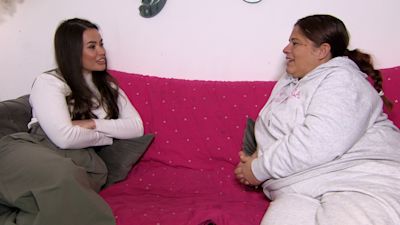The road to recovery after psychosis and the rising demand on mental health services

A former nurse who had a psychotic breakdown believes the only reason she is still alive today is down to a dedicated team of mental health specialists.
Melissa Smith, who's a mother of two, was tormented by voices urging her to take her life.
The 42-year-old, from Bolton, thinks her illness was triggered by grief after losing her mother and two sisters in quick succession.
She was taken to A&E after police officers found her trying to take her life and was referred to the Early Intervention in Psychosis Team (EIT).
The team, part of Greater Manchester Mental Health NHS Foundation Trust, works with people who have experienced a first episode of psychosis.
Staff come from a variety of disciplines, including nursing, social work, occupational therapy, and psychology and work with patients aged 14 to 65.
Melissa says at her worst - the only person helping her stay in touch with reality was her social worker Sophie Hughes.
Sophie said: "I always think someone who's experiencing psychosis is experiencing a split from reality.
"It's completely out of the blue and it's not normal for their lifestyle.
"The quicker you catch psychosis the quicker you can recover from it and the less likely they are to relapse in the future."
As part of this investigation I was given exclusive access to film with the Salford EIT and attend one of their daily risk management meetings.
Part of the job is deciding who needs their help the most and referrals have doubled in the past year.
NHS data shows cases of psychosis in the UK have risen by 29% in the past year amid the pressures of the pandemic.
Experts are urging the government to invest more in early intervention for psychosis to prevent further deterioration in people's mental health which could take them years to recover.
Here is just some of what was discussed at the daily meeting:
I also spoke to David, from Salford, who's recovering from drug induced psychosis. He started to hear voices after stopping smoking cannabis after years of heavy use.
He said: "I was complaining about people calling me names on the way to work and things like that and that wasn't actually happening.
"I was hearing things and my behaviour just deteriorated."
David's been under the care of the Salford Early Intervention Team for the past two years.
He still hears voices but with therapy has learnt how to live with them.
Taking part in activities like working on the group's allotment has helped his confidence and he's completed a building course at college.
Melissa's also back at college and inspired by the support she got from Sophie is studying to be a social worker.
For further information: